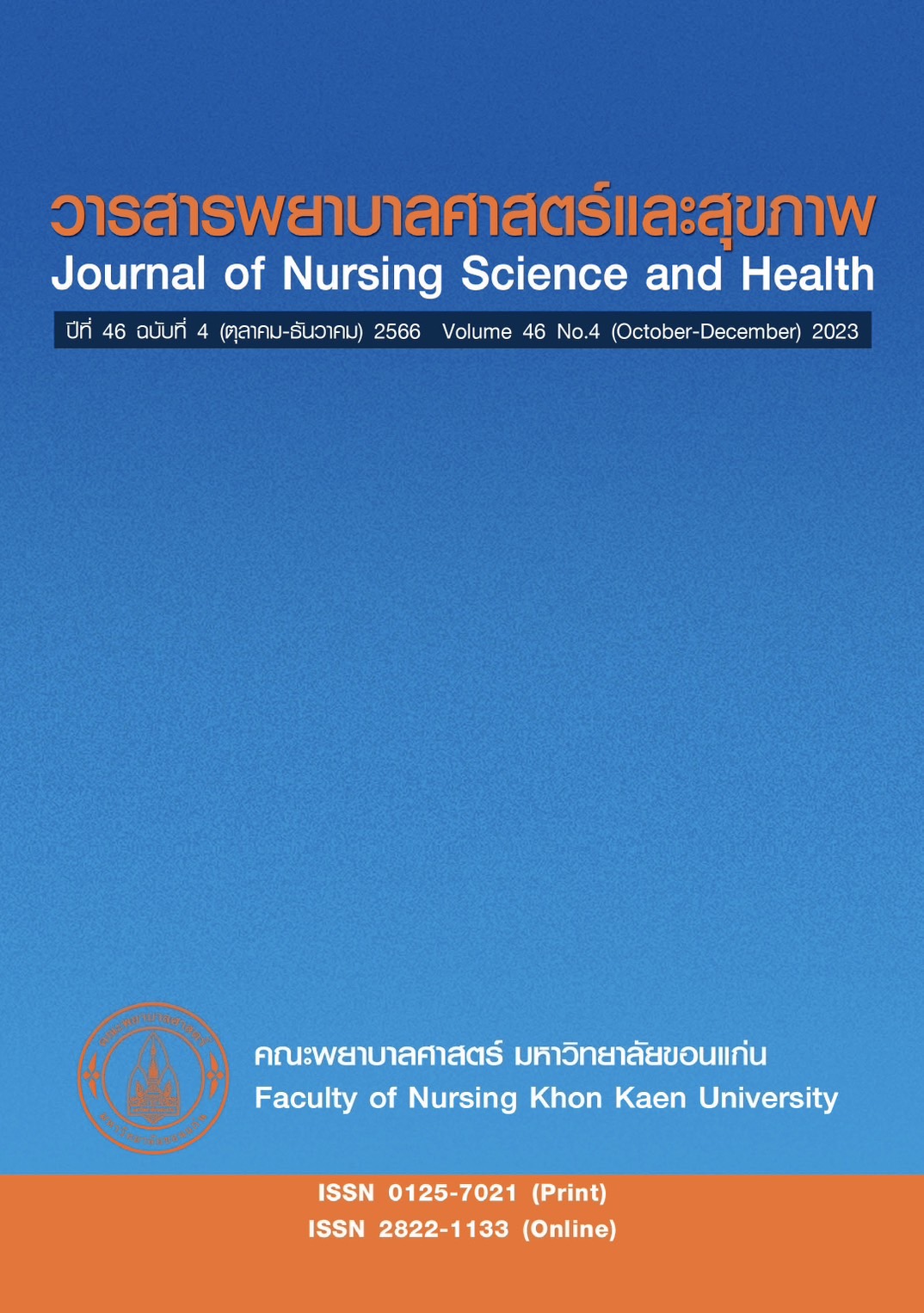การศึกษาคุณสมบัติการวัดตามเกณฑ์การวินิจฉัยภาวะสมองเสื่อมของแบบทดสอบสมรรถภาพความจำ 14 ข้อคำถามในการคัดกรองภาวะสมองเสื่อมในผู้สูงอายุ
คำสำคัญ:
แบบคัดกรองภาวะสมองเสื่อม, ผู้สูงอายุ, สมองเสื่อมบทคัดย่อ
การวิจัยเชิงบรรยายนี้เพื่อศึกษาคุณสมบัติการวัดตามเกณฑ์การวินิจฉัยภาวะสมองเสื่อมของแบบทดสอบสมรรถภาพความจำ 14 ข้อคำถามในการคัดกรองภาวะสมองเสื่อมในผู้สูงอายุ กลุ่มตัวอย่าง คือ ผู้ที่มีอายุ 60 ปีขึ้นไป อาศัยอยู่ในชุมชนพื้นที่จังหวัดฉะเชิงเทราและจังหวัดนครราชสีมา จำนวน 765 คน เก็บรวบรวมข้อมูลโดยใช้แบบสอบถามข้อมูลทั่วไป แบบทดสอบสมรรถภาพความจำ 14 ข้อคำถาม แบบทดสอบ MMSE-Thai-2002 แบบทดสอบ MoCA test ฉบับภาษาไทย และการวินิจฉัยของแพทย์ตามเกณฑ์การวินิจฉัย DSM-5 criteria ซึ่งใช้เป็นมาตรฐาน วิเคราะห์ข้อมูลใช้สถิติเชิงพรรณนา ตรวจสอบการกระจายตัวของข้อมูลโดยใช้สถิติ Kolmogorov–Smirnov test พบว่าข้อมูลทั้งหมดมีการแจกแจงโค้งปกติ จึงวิเคราะห์หาความแม่นตรงตามเกณฑ์ของแบบทดสอบ 14 ข้อคำถาม เปรียบเทียบกับเครื่องมือมาตรฐานและการวินิจฉัยของแพทย์ผู้เชี่ยวชาญ
ผลการศึกษาพบว่า ผู้สูงอายุ 765 คน มีผู้ที่ได้รับการวินิจฉัยว่ามีภาวะสมองเสื่อม ร้อยละ 5.5 ภาวะการรู้คิดบกพร่องเล็กน้อย ร้อยละ 85.9 และร้อยละ 8.6 ไม่พบปัญหา คุณสมบัติการวัดตามความแม่นตรงตามเกณฑ์ของแบบทดสอบ 14 ข้อคำถาม มีค่าความเชื่อมั่น เท่ากับ 0.928 และเมื่อพิจารณาจุดตัดที่ 30 คะแนน แบบทดสอบมีค่าความไวในการคัดกรองภาวะสมองเสื่อมอยู่ในระดับค่อนข้างต่ำ ความจำเพาะและความแม่นยำอยู่ในระดับค่อนข้างสูง [sensitivity 10.34, specificity 94.91, accuracy 88.5, PPV 14.29, NPV 92.81, AUC-ROC 0.535] ในกลุ่มภาวะสมรรถภาพสมองบกพร่องระยะต้นแบบทดสอบมีค่าความไว อยู่ในระดับค่อนข้างสูง แต่มีความจำเพาะและความแม่นยำอยู่ในระดับค่อนข้างต่ำ [sensitivity 81.03, specificity 13.72, accuracy 18.82, PPV 7.15, NPV 89.81, AUC-ROC 0.485]
เมื่อพิจารณาเลือกจุดตัดคะแนนที่เหมาะสมใหม่คือมากกว่าหรือเท่ากับ 25 คะแนน จะพบว่าค่าความไว ความจำเพาะและความแม่นยำในกลุ่มที่มีภาวะสมรรถภาพสมองบกพร่องระยะต้นจะเพิ่มขึ้น [sensitivity 87.16, specificity 14.33, accuracy 24.71, PPV 14.46 NPV 87.04, AUC-ROC 0.507] แต่ในกลุ่มที่มีภาวะสมองเสื่อมกลับพบว่า ความจำเพาะมีค่าเพิ่มขึ้นแต่ค่าความไวและค่าความแม่นยำกลับลดลง [sensitivity 7.34, specificity 94.82, accuracy 82.35, PPV 19.05, NPV 86.03, AUC-ROC 0.525]
เมื่อนำไปใช้เพื่อการคัดกรองกลุ่มภาวะสมรรถภาพสมองบกพร่องระยะต้น แยกผู้ที่มีความเสี่ยงแยกออกจากกลุ่มผู้ที่ปกติ แบบทดสอบ 14 ข้อคำถามมีค่าความไวอยู่ในระดับค่อนข้างสูงแต่ความจำเพาะและความแม่นยำในระดับต่ำ การเลือกจุดตัดคะแนนมีผลโดยตรงกับค่าความไวและความจำเพาะ ซึ่งทั้ง 2 กลุ่มมีลักษณะที่ลดลงและเพิ่มขึ้นแบบตรงกันข้าม (trade-off) เมื่อปรับจุดตัดค่าคะแนนใหม่ ดังนั้นจากผลการศึกษาในครั้งนี้ แบบทดสอบ 14 ข้อคำถาม ยังมีข้อจำกัดในประเด็นความไวและความจำเพาะที่ควรมีการศึกษาและปรับปรุงเพิ่มเติม
เอกสารอ้างอิง
Kuha O, Kumniyom N, Thongnum N, Vidhyachak C, Nakawiro D, Srisuwan P. Dementia screening tool for older peoples in Thailand. Journal of nursing and health care 2021;39(4):26-34. (in Thai)
Rojana-udomsart A, Keawsri J, editors. Clinical practice guideline for ementia. Bangkok: Neurological Institute of Thailand, Department of Medical Services, Ministry of Public Health, Thailand; 2021.
American Psychiatric Association. Diagnostic and statistical manual of mental disorders. 5th ed. Washington DC: American Psychiatric Association; 2018.
Aekplakorn W. Report of the 5th Thai people’s health survey by physical examination. Thai health survey office. Bangkok: The Graphico Systems, Thailand; 2014. (in Thai)
Foundation of Thai Gerontology Research and Development institute. The situation of thai olderpersonsin 2021. Nakhon Pathom: Institute for Population and Social Research, Mahidol University; 2022. (in Thai)
Alzheimer’s disease international. Over 41 million cases of dementia go undiagnosed across the globe–world alzheimer report reveals [Internet]. London: ADI; 2021 [cited 2022 Apr 12]. Available from: https://www.alzint.org/news-events/news/over-41-million-casesof-dementia-go-undiagnosed-across-theglobe-world-alzheimer-report-reveals/
World Health Organization. Dementia [Internet]. Geneva: WHO; 2023 [cited 2023 Mar 15]. Available from: https://www.who.int/news-room/fact-sheets/detail/dementia
World Health Organization. Dementia [International classification of diseases for mortality and morbidity statistics, 11th revision, v2023-01] [Internet]. Geneva: WHO; 2023 [cited 2023 Jul 24]. Available from: https://www.findacode.com/icd-11/block-546689346.html?hl=dementia
Kuha O, Kumniyom N, editors. Guide for assisting seniors with dementia: A manual for community caregiver volunteers. Nakhon Pathom: Institute of Geriatric Medicine, Department of Medical Services; 2020. (in Thai)
Institute of Geriatric Medicine, Department of Medical Services. Practice guidelines of comprehensive care management for older person with dementia. Nonthaburi: Institute of Geriatric Medicine, Department of Medical Services.; 2019. (in Thai)
Aroonsang P, Trakulkajornsak B, Satthapisit S, Moungkote K, Kunleun S, Subindee S. Comprehensive care system innovation for older persons with dementia: BanFang district model. TJNMP 2019;6(2):115-30.(in Thai)
Sangna R, Pinyopornpanish K, Jiraporncharoen W, Angkurawaranon C. Validation of a 14-item self-reporting questionnaire for the screening of dementia in the elderly. J Ment Health Thai 2020;28(3):199-210. (in Thai)
Ismail Z, Rajji TK, Shulman KI. Brief cognitive screening instruments: An update. Int J Geriatr Psychiatry 2010;25:111-20.
Wongpakaran N, Wongpakaran T, Reekum RV. The use of GDS-15 in detecting MDD: A comparison between residents in a Thai long-term care home and geriatric outpatients. Journal of Clinical Medicine Research 2013;5(2):101-11. (in Thai)
The committee prepared the preliminary brain test-Thai version, 1999. Mini mental examination Thai-2002, MMSE-2002. Bangkok: Institute of geriatric medicine, department of medical services, Ministry of Public Health, Thailand; 2002. (in Thai)
Hemrungrojn S, Tangwongchai S, Charoenboon T, Panasawat M, Supasitthumrong T, Chaipresertsud P, et al. Use of the montreal cognitive assessment Thai version to discriminate amnestic mild cognitive impairment from alzheimer’s disease and healthy controls: Machine learning results. Dement Geriatr Cogn Disord 2021;50(2):183-94. (in Thai)
Hosmer JrDW, Lemeshow S, Sturdivant RX. Applied logistic regression. 3rd ed. New York:John Wiley & Sons; c2013.
Sarakarn P, Munpolsri P. Optimal cut-off points receiver operating characteristic (ROC) curve analysis in developing tool of health innovation: Example using stata. Thai Bull Pharm Sci 2021;16(1):93-108. (in Thai)
Tanglakmankhong K. The role of nurses in screening and caring for older adults with mild cognitive impairment in community. JHNR 2021;37:1-13. (in Thai)
Meehanpong P, Boonsin S. The development of nursing research instruments. J Royal Thai Army Nurses [Internet]. 2021 [cited 2023 Nov 1];22(1):10-9. (in Thai)
ดาวน์โหลด
เผยแพร่แล้ว
รูปแบบการอ้างอิง
ฉบับ
ประเภทบทความ
สัญญาอนุญาต
ลิขสิทธิ์ (c) 2023 วารสารพยาบาลศาสตร์และสุขภาพ

อนุญาตภายใต้เงื่อนไข Creative Commons Attribution-NonCommercial-NoDerivatives 4.0 International License.
วารสารพยาบาลศาสตร์และสุขภาพเป็นเจ้าของลิขสิทธิ์ในการเผยแพร่ผลงานที่ตีพิมพ์ห้ามผู้ใดนำบทความที่ได้รับการตีพิมพ์ในวารสารพยาบาลศาสตร์และสุขภาพไปเผยแพร่ในลักษณะต่าง ๆ ดังนี้ การนำบทความไปเผยแพร่ออนไลน์ การถ่ายเอกสารบทความเพื่อกิจกรรมที่ไม่ใช่การเรียนการสอน การส่งบทความไปตีพิมพ์เผยแพร่ที่อื่น ยกเว้นเสียแต่ได้รับอนุญาตจากวารสารพยาบาลศาสตร์และสุขภาพ



